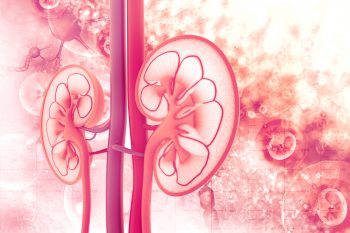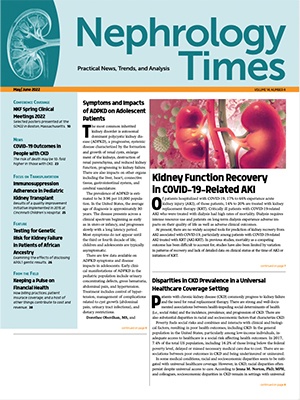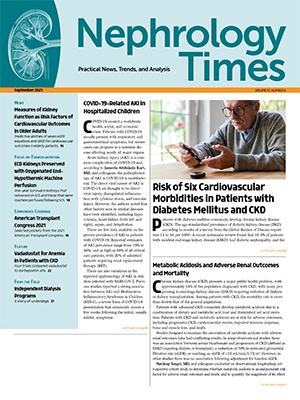
Results of recent studies have suggested that there is an association between metabolic acidosis and mortality and graft failure in kidney transplant recipients. However, there are few data available on whether levels of serum bicarbonate, measured as total carbon dioxide (tCO2) in serum, predict cardiovascular events following kidney transplantation.
Arjang Djamali, MD, and colleagues conducted an observational cohort study to determine whether metabolic acidosis is a risk factor for cardiovascular events in kidney transplant recipients. Results of the study were reported in the American Journal of Kidney Diseases [2019;73(4):47 6-485].
The single-center study included 2128 kidney transplant recipients who were free of cardiovascular events during the first 13.5 months post-transplantation. The outcomes of interest were ischemic, arrhythmia, and heart failure cardiovascular events, as well as death from any cause.
Multivariable proportional hazards regression models were used to assess independent associations. Nonlinear associations were examined using restricted cubic spline Poisson models, and associations at different tCO2 levels were assessed using linear spline proportional hazards models.
The prevalence of metabolic acidosis, defined as tCO2 level <24 mEq/L, was 38.8% (n=826). During median follow-up of 4 years, of the 2128 kidney transplant recipients in the study, 384 had a cardiovascular event and 610 died. The cardiovascular events included 241 ischemic, 137 arrhythmic, and 150 heart failure events.
There was an association between tCO2 level <20 mEq/L and increased risk for cardiovascular events (adjusted hazard ratio [aHR], 2.00; 95% confidence interval [CI], 1.29-3.10) compared with the reference category of tCO2 level of 24.0 to 25.9 mEq/L. The association was due primarily to ischemic cardiovascular events (aHR, 2.28; 95% CI, 1.34-3.90). For those with tCO2 level <24 mEq/L, for every 1 mEq/L lower tCO2 level the risks for all cardiovascular events and ischemic events were 17% and 15% higher, respectively (aHR for all cardiovascular events, 0.83; 95% CI, 0.74-0.94; aHR for ischemic events, 0.85; 95% CI, 0.74-0.99).
There was an independent association between tCO2 level <20 mEq/L compared with tCO2 level of 24.0 to 25.9 mEq/L and all-cause mortality (aHR, 1.43; 95% CI, 1.02-2.02). For every 1 mEq/L lower tCO2 level for those with tCO2 level <24 mEq/L, there was a 17% higher risk for death (aHR, 0.83; 95% CI, 0.75-0.92).
The single-center observational design was cited as a limitation to the study findings.
In conclusion, the researchers said, “Metabolic acidosis is an independent risk factor for ischemic cardiovascular events after kidney transplantation. It is unknown whether correction of acidosis improves outcomes in these patients.







 © 2025 Mashup Media, LLC, a Formedics Property. All Rights Reserved.
© 2025 Mashup Media, LLC, a Formedics Property. All Rights Reserved.